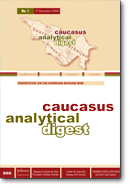No. 117: Agriculture and Trade with Russia

Author(s): Phatima Mamardashvili, Salome Gelashvili, Ia Katsia, Salome Deisadze, Sophie Ghvanidze, Linda Bitsch, Jon Hanf, Linde Götz
Series Editor(s): Linde Götz (Special Editor), Miranda Svanidze (Special Editor), Lusine Badalyan, Bruno De Cordier, Farid Guliyev, Diana Lezhava, Lili Di Puppo, Jeronim Perović, Heiko Pleines, Abel Polese, Licínia Simão, Koba Turmanidze
Series: Caucasus Analytical Digest (CAD)
Issue: 117
Publisher(s): Center for Security Studies (CSS), ETH Zürich; Research Centre for East European Studies (FSO), University of Bremen; Caucasus Research Resource Center (CRRC-Georgia); Center for Eastern European Studies (CEES), University of Zurich; German Association for East European Studies (DGO)
Publication Year: 2020
